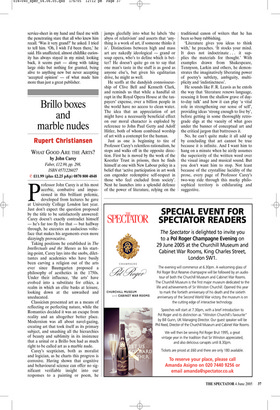Brillo boxes and marble nudes
Rupert Christiansen
WHAT GOOD ARE THE ARTS? by John Carey Faber, £12.99, pp. 298, ISBN 0571226027 ✆ £11.99 (plus £2.25 p&p) 0870 800 4848 Professor John Carey is at his most acerbic, combative and impassioned in this brilliant polemic, developed from lectures he gave at University College London last year. Just don’t expect the question proposed by the title to be satisfactorily answered: Carey doesn’t exactly contradict himself — he’s far too fly for that — but halfway through, he executes an audacious volteface that makes his arguments even more dizzyingly provocative.
Taking positions he established in The Intellectuals and the Masses as his starting-point, Carey lays into the snobs, dilettantes and academics who have busily been carving a religion out of the arts ever since Baumgarten proposed a philosophy of aesthetics in the 1750s. Under their influence, ‘the arts’ have evolved into a substitute for ethics, a realm in which an elite basks at leisure, looking down at the unwashed and uneducated.
Classicism presented art as a means of reflecting or perfecting nature, while the Romantics decided it was an escape from reality and an altogether better place. Modernism was all about navel-gazing, creating art that took itself as its primary subject, and smashing all the hierarchies of beauty and sublimity in its insistence that a urinal or a Brillo box had as much right to be called art as a marble nude.
Carey’s scepticism, both as moralist and logician, as he charts this progress is corrosive. Having shown that cognitive and behavioural science can offer no significant verifiable insight into our responses to a painting or poem, he jumps gleefully into what he labels ‘the abyss of relativism’ and asserts that ‘anything is a work of art, if someone thinks it is’. Distinctions between high and mass art are nakedly ideological — grand or soap opera, who’s to define which is better? He doesn’t quite go on to say that one man’s taste in the stuff is as good as anyone else’s, but given his egalitarian drive, he might as well.
He scoffs at the dandyish connoisseurship of Clive Bell and Kenneth Clark, and reminds us that while a handful sit rapt in the Royal Opera House at the taxpayers’ expense, over a billion people in the world have no access to clean water. The idea that an appreciation of art might have a necessarily beneficial effect on our moral character is exploded by reference to John Paul Getty and Adolf Hitler, both of whom combined worship of art with a contempt for the human.
Just as one is beginning to tire of Professor Carey’s relentless rationalism, he stops and walks off in the opposite direction. First he is moved by the work of the Koestler Trust in prisons, then he finds himself at one with New Labour policy in a belief that ‘active participation in art work can engender redemptive self-respect in those who feel excluded from society’. Next he launches into a splendid defence of the power of literature, relying on the traditional canon of writers that he has been so busy rubbishing.
‘Literature gives you ideas to think with,’ he preaches. ‘It stocks your mind. It does not indoctrinate ... it supplies the materials for thought.’ With examples drawn from Shakespeare, Tennyson, Larkin and others, he demonstrates the imaginatively liberating power of poetry’s subtlety, ambiguity, multiplicity and ‘indistinctness’.
He sounds like F. R. Leavis as he extols the way that ‘literature renews language, rescuing it from the shallow grave of dayto-day talk’ and how it can play ‘a vital role in strengthening our sense of self’, providing ideas ‘strong enough to live by’, before getting in some thoroughly retrograde digs at the vacuity of what goes under the banner of conceptual art and the critical jargon that buttresses it.
No, he can’t quite make it all add up by concluding that art cannot be true because it is infinite. And I want him to hang on a minute when he airily assumes the superiority of the written word over the visual image and musical sound. But you don’t want him to stop. Not least because of the crystalline lucidity of the prose, every page of Professor Carey’s two-way ride through this murky philosophical territory is exhilarating and suggestive.


















































 Previous page
Previous page